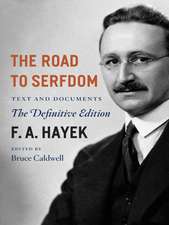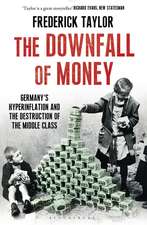November 1918: The German Revolution: Making of the Modern World
Autor Robert Gerwarthen Limba Engleză Hardback – 25 iun 2020
Preț: 139.18 lei
Preț vechi: 178.27 lei
-22% Nou
Puncte Express: 209
Preț estimativ în valută:
26.63€ • 27.81$ • 22.04£
26.63€ • 27.81$ • 22.04£
Carte disponibilă
Livrare economică 04-10 martie
Livrare express 01-07 martie pentru 69.97 lei
Preluare comenzi: 021 569.72.76
Specificații
ISBN-13: 9780199546473
ISBN-10: 0199546479
Pagini: 368
Ilustrații: Maps and black and white illustrations
Dimensiuni: 144 x 217 x 33 mm
Greutate: 0.48 kg
Editura: OUP OXFORD
Colecția OUP Oxford
Seria Making of the Modern World
Locul publicării:Oxford, United Kingdom
ISBN-10: 0199546479
Pagini: 368
Ilustrații: Maps and black and white illustrations
Dimensiuni: 144 x 217 x 33 mm
Greutate: 0.48 kg
Editura: OUP OXFORD
Colecția OUP Oxford
Seria Making of the Modern World
Locul publicării:Oxford, United Kingdom
Recenzii
Gerwarth argues in his polished narrative drawing on the eyewitness testimony of famous writers and thinkers that Weimar was not "the doomed republic" of legend, a hopeless 14-year interval between a warmongering Kaiser and Hitlers Nazi dictatorship, but a success in its own right... 'November 1918' is a perceptive study of an orderly people who proved that a revolution need not lead to extremes of left and right.
Gerwarth's November 1918 [is one] of the most stimulating histories of the interwar period to have been published in recent years.
Gerwarth's scholarship cannot be faulted... a superlative piece of research into a sequence of events that are of immense importance.
Readable and informative.
Authoritative new account... Gerwarth has... done us [a] service by rescuing the Weimar Republic from what EP Thompson, in another context, called 'the enormous condescension of posterity'.
[Gerwarth's] account is written in clear prose and richly documented with eyewitness accounts from the most vivid diaries and correspondence of the period. As an audacious bid to restore the German Revolution to its rightful place in history, November 1918 could hardly have been more skillfully executed.
...stands out as one of the most successful...
Splendidly researched, and with a striking new thesis... a fascinating study, whose insights will stop you dead even if you thought, as I did, that you already knew this stuff.
Thought-provoking and readable ... Gerwarth's invaluable book shows that, compared to their counterparts in other central European states facing similar turmoil, the moderate German revolutionaries had spectacular success in securing their democracy. By 1929, only cataclysmic economic crisis could overturn what was Europes most open and representative liberal state. Hitler, it seems, got lucky.
its salutary to have a fresh account of the birthing pains of that vaunted republic rather than another autopsy of its demise Where Gerwarth most excels is deftly weaving together the impressions of contemporary commentators, of whom he has assembled a rich banquet: Victor Serge, Thomas Mann, Kaethe Kollwitz, Alfred Doeblin, Harry Graf Kessler, and Joseph Roth, among others.
A fascinating narrative of the events that transpired during the time in which Germans called for a more democratic government and more political and social freedom. Throughout the book, the author balances small biographies of important political leaders with the extensive use of newspapers, memoirs, and letterseffectively giving those who lived through the revolution a voice Gerwarths book is a wonderful addition to the history of the Weimar Republic.
November 1918 provides a first-rate survey of events and personalities surrounding the revolution in Germany ... Robert Gerwarth has written a detailed account of a fascinating topic. The writing is clear and avoids jargon and theory. The research is thorough, as is made evident by the notes and the comprehensive bibliography. His book has academic credibility but can also be recommended for the general reader.
Meticulously researched, judiciously argued, and written with enviable panache, November 1918 is an engaging history with much original insight that should become the standard work on the subject.
Gerwarth's November 1918 [is one] of the most stimulating histories of the interwar period to have been published in recent years.
Gerwarth's scholarship cannot be faulted... a superlative piece of research into a sequence of events that are of immense importance.
Readable and informative.
Authoritative new account... Gerwarth has... done us [a] service by rescuing the Weimar Republic from what EP Thompson, in another context, called 'the enormous condescension of posterity'.
[Gerwarth's] account is written in clear prose and richly documented with eyewitness accounts from the most vivid diaries and correspondence of the period. As an audacious bid to restore the German Revolution to its rightful place in history, November 1918 could hardly have been more skillfully executed.
...stands out as one of the most successful...
Splendidly researched, and with a striking new thesis... a fascinating study, whose insights will stop you dead even if you thought, as I did, that you already knew this stuff.
Thought-provoking and readable ... Gerwarth's invaluable book shows that, compared to their counterparts in other central European states facing similar turmoil, the moderate German revolutionaries had spectacular success in securing their democracy. By 1929, only cataclysmic economic crisis could overturn what was Europes most open and representative liberal state. Hitler, it seems, got lucky.
its salutary to have a fresh account of the birthing pains of that vaunted republic rather than another autopsy of its demise Where Gerwarth most excels is deftly weaving together the impressions of contemporary commentators, of whom he has assembled a rich banquet: Victor Serge, Thomas Mann, Kaethe Kollwitz, Alfred Doeblin, Harry Graf Kessler, and Joseph Roth, among others.
A fascinating narrative of the events that transpired during the time in which Germans called for a more democratic government and more political and social freedom. Throughout the book, the author balances small biographies of important political leaders with the extensive use of newspapers, memoirs, and letterseffectively giving those who lived through the revolution a voice Gerwarths book is a wonderful addition to the history of the Weimar Republic.
November 1918 provides a first-rate survey of events and personalities surrounding the revolution in Germany ... Robert Gerwarth has written a detailed account of a fascinating topic. The writing is clear and avoids jargon and theory. The research is thorough, as is made evident by the notes and the comprehensive bibliography. His book has academic credibility but can also be recommended for the general reader.
Meticulously researched, judiciously argued, and written with enviable panache, November 1918 is an engaging history with much original insight that should become the standard work on the subject.
Notă biografică
Robert Gerwarth is Professor of Modern History at UCD and Director of the Centre for War Studies. He is the author of The Bismarck Myth (Oxford UP, 2005) and a biography of Reinhard Heydrich (Yale UP, 2011). His third monograph, The Vanquished: Why the First World War Failed to End was published by Penguin (UK) and FSG (US) in the autumn of 2016. He has authored several articles in leading international journals such as Past & Present, The Journal of Modern History, Geschichte & Gesellschaft, and Vingtième Siècle. His work has been translated into some thirty languages.










